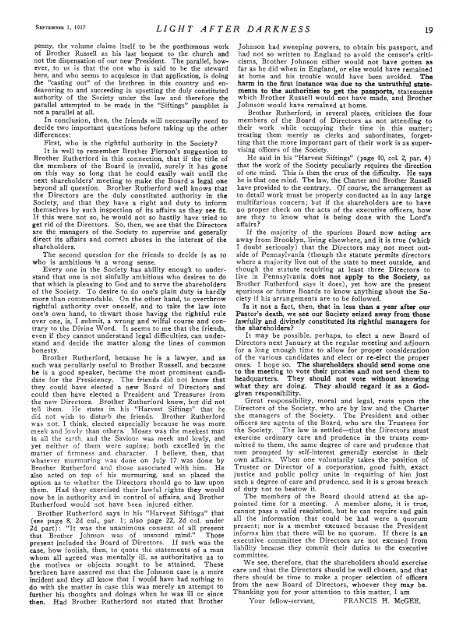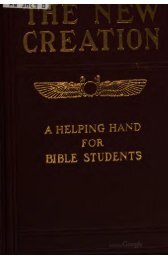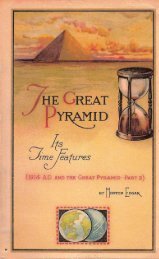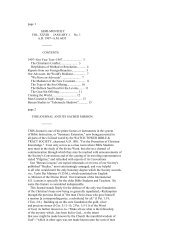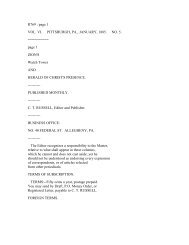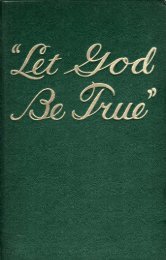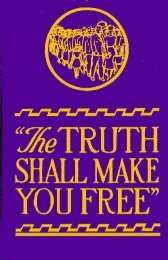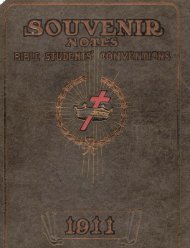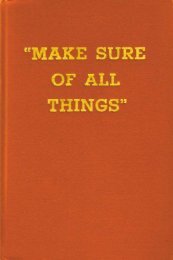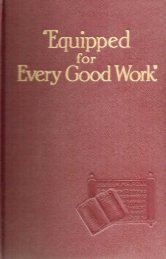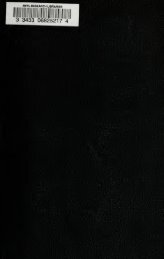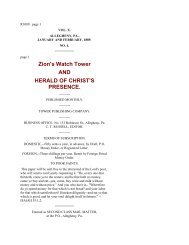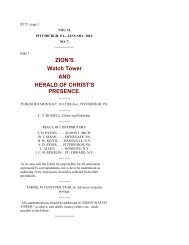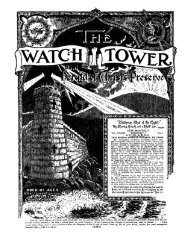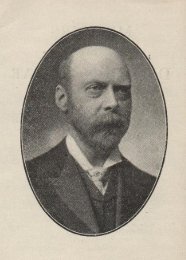1917 Watchtower Bible Student Schism - A2Z.org
1917 Watchtower Bible Student Schism - A2Z.org
1917 Watchtower Bible Student Schism - A2Z.org
Create successful ePaper yourself
Turn your PDF publications into a flip-book with our unique Google optimized e-Paper software.
SEPTEMBER 1, <strong>1917</strong><br />
LIGHT AFTE<br />
penny, the volume claims itself to be the posthumous work<br />
of Brother Russell a.s his last bequest to the church and<br />
not the dispensation of our new President. The parallel, however,<br />
to us is that the one who is said to be the steward<br />
here, and who seems to acquiesce in that application, is doing<br />
the "casting out" of the brethren in this country and endeavoring<br />
to and succeeding in upsetting the duly constituted<br />
authority of the Society under the law and therefore the<br />
parallel attempted to be made in the "Siftings" pamphlet is<br />
not a parallel at all.<br />
In conclusion, then, the friends will necessarily need to<br />
decide two important questions before taking up the other<br />
differences:<br />
First, who is the rightful authority in the Society<br />
It is well to remember Brother Pierson's suggestion to<br />
Brother Rutherford in this connection, that if the title of<br />
the members of the Board is invalid, surely it has gone<br />
on this way so long that he could easily wait until the<br />
next shareholders' meeting to make the Board a legal one<br />
beyond all question. Brother Rutherford well knows that<br />
the Directors are the duly constituted authority in the<br />
Society, and that they have a right and duty to inform<br />
themselves by such inspection of its affairs as they see fit.<br />
If this were not so, he would not so hastily have tried to<br />
get rid of the Directors. So, then, we see that the Directors<br />
are the managers of the Society to supervise and generally<br />
direct its affairs and correct abuses in the interest of the<br />
shareholders.<br />
The second question for the friends to decide is as to<br />
who is ambitious in a wrong sense.<br />
Every one in the Society has ability enough to understand<br />
that one is not sinfully ambitious who desires to do<br />
that which is pleasing to God and to serve the shareholders<br />
of the Society. To desire to do one's plain duty is hardly<br />
more than commendable. On the other hand, to overthrow<br />
rightful authority over oneself, and to take the law into<br />
one's own hand, to thwart those haviqg the rightful rule<br />
over one, is, I submit, a wrong and wilful course and contrary<br />
to the Divine Word. It seems to me that the friends,<br />
even if they cannot understand legal difficulties, can understand<br />
and decide the matter along the lines of common<br />
honesty.<br />
Brother Rutherford, because he is a lawyer, and as<br />
such was peculiarly useful to Brother RusselI, and because<br />
he is a good speaker, became the most prominent candi-<br />
date for the Presidency. The friends did not know that<br />
they could have elected a new Board of Directors and<br />
could then 'have elected a President and Treasurer from<br />
the new Directors. Brother Rutherford knew, but did not<br />
tell ihem. He states in his "Harvest Siftings" that he<br />
did not yish to disturb the friends. Brother Rutherford<br />
R-as not. I think, elected especially because he was more<br />
meek and lo~~ly than others. Moses was the meekest man<br />
in all the earth, and the Saviour was meek and lowly, and<br />
yet neither of them were supine; both excelled in the<br />
matter of firmness and character. I believe, then, that<br />
whatever murmuring was done on July 17 was done by<br />
Brother Rutherford and those associated with him. He<br />
also acted on top of his murmuring, and so placed the<br />
option as to whether the Directors should go to law upon<br />
them. Had they exercised their lawful rights they would<br />
now be in authority and in control of affairs, and Brother<br />
Rutherford would not have been injured either.<br />
Brother Rutherford says in his "Harvest Siftings" that<br />
(see page 8, 2d col., par. 1; also page 22, 2d col. under<br />
2d part): "It was the unanimous consent of all present<br />
that Brother Johnson was of unsound mind." Those<br />
present included the Board of Directors. If such was the<br />
case, how foolish, then, to quote the statements of a man<br />
whom all agreed was mentally ill, as authoritative as to<br />
the motives or objects sought to be attained. These<br />
brethren have assured me that the Johnson case is a mere<br />
incident and they all know that I would have had nothing to<br />
do with the matter in case this was merely an attempt to<br />
further his thoughts and doings when he was ill or since<br />
then. Had Brother Rutherford not stated that Brother<br />
R DARKNESS<br />
Johnson had sweeping powers, to obtain his passport, and<br />
had not so written to England to avoid the censor's criticisms,<br />
Brother Johnson either would not have gotten as<br />
far as he did when in England, or else would have remained<br />
at home and his trouble would have been avoided. The<br />
harm in the first instance was due to the untruthful statements<br />
to the authorities to get the passports, statements<br />
which Brother Russell would not have made, and Brother<br />
Johnson would have rema'ined at home.<br />
Brother Rutherford, in several places, criticises the four<br />
members of the Board of Directors as not attending to<br />
their work while occupying their time in this matter;<br />
treating them merely as clerks and subordinates, f<strong>org</strong>etting<br />
that the nore important part of their work is as supervising<br />
officers of the Society.<br />
He said in his "Harvest Siftings" (page 10, col. 2, par. 4)<br />
that the work of the Society peculiarly requires the direction<br />
of one mind. This is then the crux of the difficulty. He says<br />
he is that one mind. The law, the Charter and Brother Russell<br />
have provided to the contrary. Of course, the arrangement as<br />
to detail work must be properly conducted as in any large<br />
multifarious concern; but if the shareholders are to have<br />
00 proper check on the acts of the executive officers, how<br />
are they to know what is being done with the Lord's<br />
affairs<br />
If the majority of the spurious Board now acting are<br />
away from Brooklyn, living elsewhere, and it is true (whicb<br />
I doubt seriously) that the Directors may- not meet outside<br />
of Pennsylvania (though the statute permits directors<br />
where a majority live out of the state to meet outside, and<br />
though the statute requiring at least three Directors to<br />
live in Pennsylvania does not apply to the Society, as<br />
Brother Rutherford says it does), yet how are the present<br />
spurious or future Boards to know anything about the Society<br />
if his arrangements are to be followed.<br />
Is it not a fact, then, that in less than a year after our<br />
Pastor's death, we see our Society seized away from those<br />
lawfully and divinely constituted its rightful managers for<br />
the shareholders<br />
It may be possible, perhaps, to elect a new Board of<br />
Directors next January at the regular meeting and adjourn<br />
for a long enough time to allow for proper consideration<br />
of the various candidates and elect or re-elect the proper<br />
ones. I hope so. The shareholders should send some one<br />
to the meeting to vote their proxies and not send them to<br />
headquarters. They should not vote without knowing<br />
what they are doing. They should regard it as a Godgiven<br />
responsibility.<br />
Great responsibility, moral and legal, rests upon the<br />
Directors of the Society, who are by law and the Charter<br />
the managers of the Society. The President and other<br />
officers are agents of the Board, who are the Trustees for<br />
the Society. The law is settled-that the Directors must<br />
exercise ordinary care and prudence in the trusts committed<br />
to them, the same degree of care and prudence that<br />
men prompted by self-interest generally exercise in their<br />
own affairs. When one voluntarily takes the position of<br />
Trustee or Director of a corporation, good faith, exact<br />
justice and public policy unite in requiring of him just<br />
such a degree of care and prudence, and it is a gross breach<br />
of duty not to bestow it.<br />
The members of the Board should attend at the appointed<br />
time for a meeting. A member alone, it is true,<br />
cannot pass a valid resolution, but he can require and gain<br />
all the information that could be had were a quorum<br />
present; nor is a member excused because the President<br />
informs him that there will be no quorum. If there is an<br />
executive committee the Directors are not excused from<br />
liability because they commit their duties to the executive<br />
committee.<br />
We see, therefore, that the shareholders should exercise<br />
care and that the Directors should be well chosen, and that<br />
there should be time to make a proper selection of officers<br />
from the new Board of Directors, whoever they may be.<br />
Thanking you for your attention to this matter, I am<br />
Your fellow-servant, FRANCIS H. McGEE.


